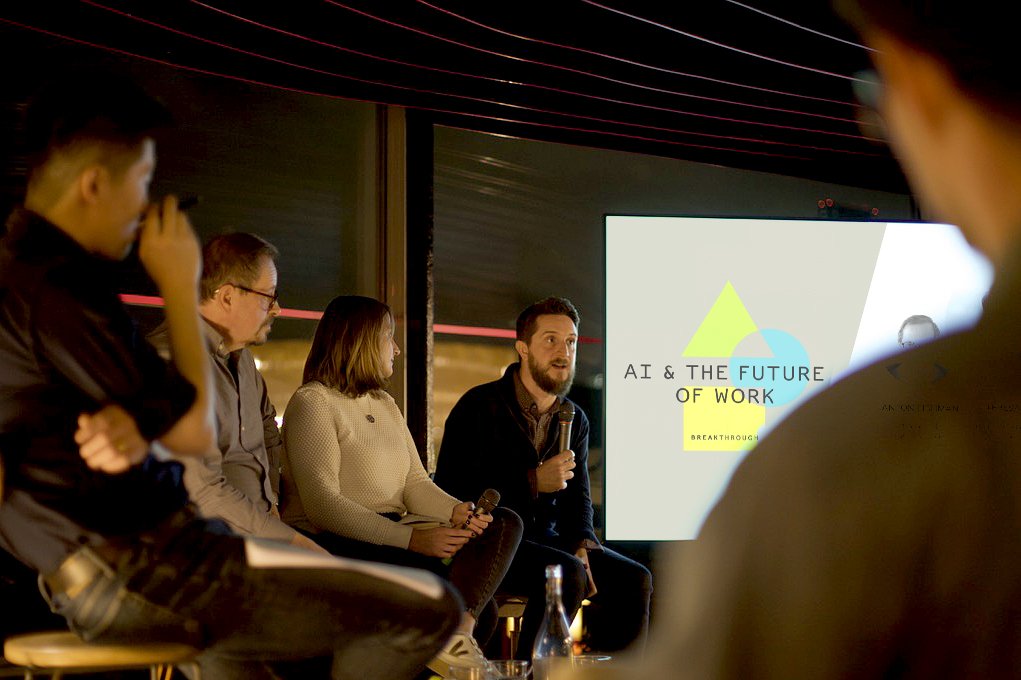Why Is Intrapreneurship Important for The Future of Work?
Discover how businesses can prepare their people for the future of work and AI. Make yourself indispensable in a tech-orientated world with Studio Zao.
On Tuesday 25th February 2020, we teamed up with Second Home and City AI to host an exclusive event on artificial intelligence (AI) and the future of work.
As the development of intelligent machines continues to shake the world of business, we’re eager to stay one step ahead of the game and understand how companies can best prepare for the so-called ‘fourth industrial revolution.’
Whether it’s getting to work in driverless cars, using clever algorithms to process Big Data, or developing cunning chatbots to change the face of customer care, AI is transforming the modern workplace. McKinsey & Company expect the rise of automation over the next decade to displace up to 800 million jobs.
Former CEO of Google, Eric Schmidt argues businesses must upskill their workforce with entrepreneurial skills to thrive in a tech-orientated world. We invited Teresa Kotlicka, Anton Fishman and Iain Wallace to discuss the importance of entrepreneurial skills to prepare their people for the future of work.
Teresa Kotlicka was previously People Development Director at Sony Music Entertainment. She is committed to harnessing the power of people and culture in a tech-orientated workplace, and advises Studio Zao on People, Talent and Culture
Anton Fishman is a talent tech start-up advisor. As the Director of Future and People, Anton advises organisations and their HR functions on the impact of the latest tech innovations, including Studio Zao.
Iain Wallace is the Head of Innovation at Accelerated Capability Environment Government UK and innovation professional at Cyber London. He has years of experience in business development, product strategy and the development of leadership personnel.
HR Trends & The Future Of Work
As technology plays an increasingly important role in how HR teams operate and the daily functions of a business, what will the future of work look like?
Increased applications of AI have the potential to boost efficiency across the workplace and free-up valuable time for businesses to focus on other areas of development. Similarly to how the invention of the steam engine helped businesses thrive in the first industrial revolution, the rise of intelligent tech could hold the key to unlocking a world of new opportunities for modern businesses.
We’re excited to see how businesses can harness the power of AI to create new products and enhance their services. Whether it’s using sophisticated HR management platforms to improve employee experiences or upskilling manual labourers to develop a more sophisticated skillset, AI is changing the game for almost all industries.
How Will AI Impact the Future Of Work?
As Anton Fishman explained at the event, “AI is taking over the more boring tasks and using automation to handle dangerous jobs.” Research shows that around 50% of current working activities could be automated by adapting existing AI technologies.
One of the most powerful features of AI is its ability to process complex datasets and run simulations to look into the future. Anton Fishman argues that “AI technologies are basically prediction engines that are driving down forecasting to the level of a commodity.”
While traditional forecasting disciplines rely on predicting market trends, AI can harness the power of big data and the internet of things (IoT) to make predictions on a microscopic level.
What Do We Mean by ‘Entrepreneurial Skills’?
Although the term ‘entrepreneur’ is typically associated with individuals who set sail on their own business venture, an entrepreneurial skill set can also apply to employees within an organisation.
As the future of work turns towards automation, the key to job security is to master skills that computers are unable to replicate. Entrepreneurs’ attitudes and skills are entirely unique — a factor all three of our guest speakers recognised.
What Exactly Are Entrepreneurial Skills?
Entrepreneurial skills refer to a person’s ability to think outside the box and apply creative thinking when faced with a new challenge. Although computers can be programmed to process complex tasks, the human brain is superior when it comes to lateral thinking and motivating teams.
At the event, Teresa Kotlicka explained how “entrepreneurs can play to their strengths” by embracing new technologies and pushing boundaries. Instead of resisting emerging technology, individuals with strong entrepreneurial skills can gain a competitive edge by combining their passions with a digital transformation strategy.
Forward-thinking companies are turning towards ‘intrapreneurs’ to embrace internal creativity and build teams of lateral thinkers. Teresa explains that intrapreneurs can operate successfully in an organisation that embraces the latest AI technologies, without forfeiting their desire to thrive in team environments.
Why Are Entrepreneurial Skills So Important?
In a 2014 statement at Davos, Eric Schmidt explained that the solution to the rapidly-evolving job market is “to upskill the workforce in entrepreneurial skills so they could survive this new era”.
An entrepreneurial thinker is someone who understands people and knows how to strike a chord with their emotional heartstrings — something computers struggle to replicate.
Companies must embrace entrepreneurial employees, or intrapreneurs, to differentiate their workforce from the rest of the pack. Upskilling teams so they can master complex human tasks can unlock serious benefits for modern businesses. For example, Amazon recently announced plans to spend a whopping $700 million to help a cohort of 100,000 workers become “highly-skilled” employees by 2025.
The Power of Emotional Intelligence
The ultimate advantage humans hold over machines is our ability to feel empathy. By connecting with people on an emotional level and understanding their intrinsic desires, we can build trust, establish loyalty and create meaningful experiences.
While robots might be amazing at processing millions of calculations, a human’s ability to read people and put themselves in their shoes is wonderfully unique.
Teresa explained that “if your business is about creating relationships, then your intrapreneurs need to have the emotional skills to get close to people and create trust.” Imagine sitting down with a computer to discuss partnership opportunities over coffee — it just wouldn’t happen!
Understanding emotional intelligence is all about knowing when to give people time and space to explore themselves. Teresa also explained the value of employees using their creativity to explore new opportunities and possibilities. As AI takes control of day-to-day tasks, humans must let their imaginations run wild to push boundaries and discover new, exciting ways to grow.
Remember — exploration doesn’t necessarily mean you’re lost! As Ian Wallace explained, “entrepreneurship is always a retaliation to society and what does not work.”
Sometimes the only way to move forward is to lose yourself in new ideas and explore alternative perspectives.
What Is Uniquely Human?
AI is not going to change the fundamental ways in which humans work. If anything, the rise of automation will help humans push creative boundaries and discover new opportunities.
Teresa explained how AI could liberate humans from mundane routines. Our ability to experience empathy will differentiate us from sophisticated machines, and future careers will require entrepreneurial thinkers to “connect the dots” and “mobilise energy.”







